#I’ll probably be editing in the future to fix my inevitable typos that I know I have but constantly miss as per usual
Explore tagged Tumblr posts
Text
First of all, let me start by saying, Geshtu is absolutely, completely, and irrevocably insane.
Of the three, he is the least sane. Now this isn’t me saying “HAHA HES COOKOO HAHA WOW WHAT A MANIAC” No it’s not like that at all. You see, the thing about Geshtu is that he doesn’t seem “insane” at all, in fact, compared to Nergal and Dumuzi he comes across as perfectly put together.
The thing about Geshtu is that he is completely convinced by his own delusions. And he has convinced himself so fully of these delusions that he has not only sold them to himself but also to others. The voices he hears, to him, are completely real. He believes so wholeheartedly that he is a vessel for Theias voice that he puts on this complete and divine demeanor. He seems more sane than the others because he carries himself that way.
Dumuzi knows she has problems and she hides from them. Nergal definitely knows he has some screws loose but he embraces it. Geshtu, meanwhile, instead of pushing down his insanity like Dumuzi or embracing it like Nergal, he strides side by side with his.
Now let’s go back to the late Cretaceous where Geshtu grew up. Small groups of family camps were common throughout the Mesozoic, even moreso than villages such as where Cro, Dumuzi, and Nergal were raised. These groups would travel to trade with other family camps, exchanging information, intermingling, ect. But afterwards they’d return to their own family burrow to live their lives. They were foragers and hunters. Geshtus family in particular specialized in fishing and insect hunting.
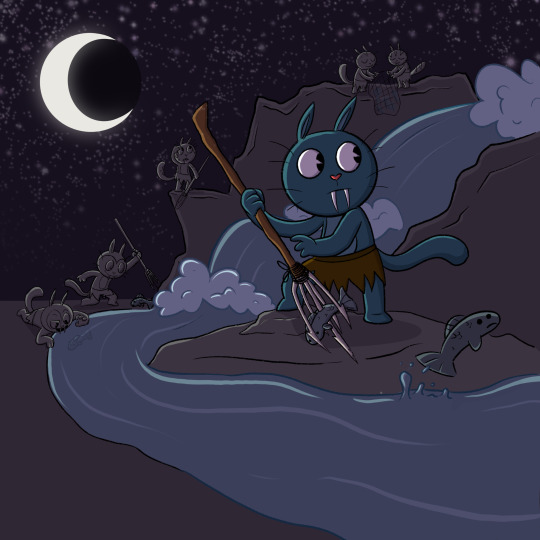
Geshtu was still Geshtu. He was always a little more quiet and methodical than his other siblings, traits he’s kept with him.
So I’ve mentioned on the backstory posts before how most mammals during the Mesozoic lived nocturnally for their own safety. The large reptilian predators at the time were mostly diurnal so there was less risk of being ripped apart and eaten at night. But there are always exceptions.
One night, as the family was waking to begin their evening routines, there was a scratching above the burrow. And then the ceiling fell through.
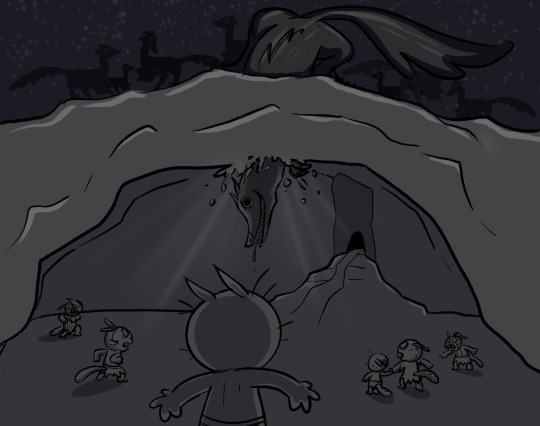
A pack of stenonychosaurus, a species of Troodontid, had dug their way into the burrow. They had been invaded. The Stenonychosaurus pack flooded into the burrow and made short work of maiming and devouring the entire family.
Geshtu got hurt, not horribly but enough to cause him to fall and become temporarily disoriented. He would be next if he did not find a place to hide. As he frantically looked around, he noticed a beam of moonlight breaking through the torn overhead of his families burrow. The light washed over a bundle of rocks and debris that had fallen from the ceiling and there was a small gap between them. Small enough for him to fit.

While the troodons were preoccupied with their current meals, Geshtu managed to crawl over to the small opening and discreetly push himself inside it undetected. And he hid there, unable to do anything but watch and wait as his family was torn apart in front of him.
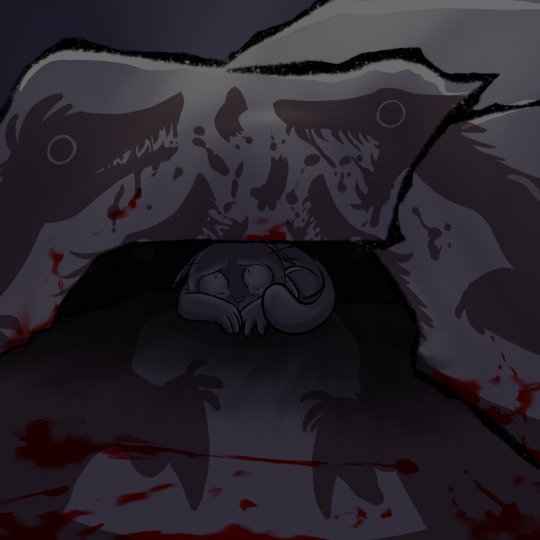
Eventually the troodons finished feeding, were filled, and left. Not much was left behind, save for a few bodies still intact. Geshtu cautiously creeped out of his hiding spot after the coast was clear and went to check on what bodies he could, hoping to find survivors. He found one body that seemed fairly intact, he dragged it out of the pile of death and tried to lift it up into a sitting position. It fell back over with a heavy thud. Blood was everywhere, his tail dragged in it, it coated his hands. No one but him was left alive among the wreckage.
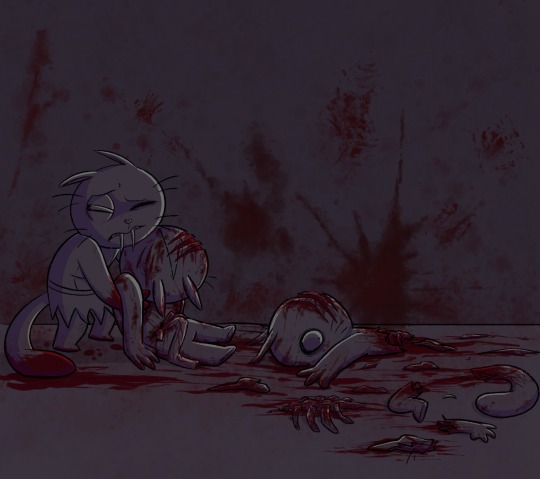
Realizing the hopelessness of his endeavor he backed up against the burrow wall. He covered his eyes with his hands, hoping that by not being able to see the wreckage anymore, it would disappear. Maybe when he removed his hands it would have turned out to all be a nightmare. But when he did, everything was still as it had been.
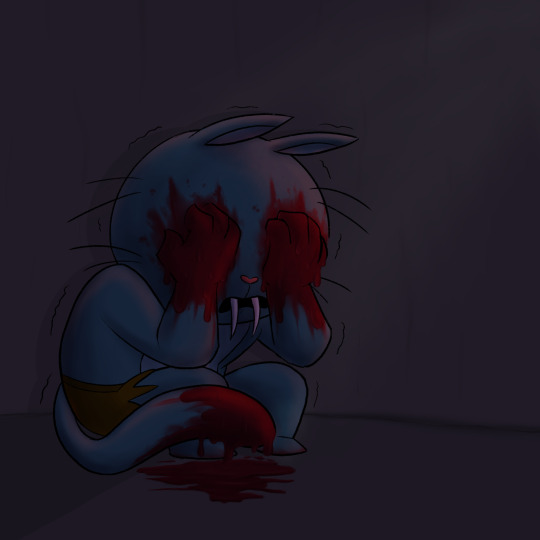
The moonlight shone down on him from the burrows exit. Its guidance had saved him from the slaughter, so he decided to follow it again. He limped out of the burrow into the open night and made his way to the family creek that sat just outside to wash the blood off his hands. It was then that he caught his reflection in the water. The blood from his hands had marked his face and he could see it now. And, reflected above his head in the water, he saw the moon. Full and bright and comforting. He took this as a sign that the moon had marked him, and he was reborn under it. So he ceased washing it away, stood up, stared at the moon, and began to follow it.
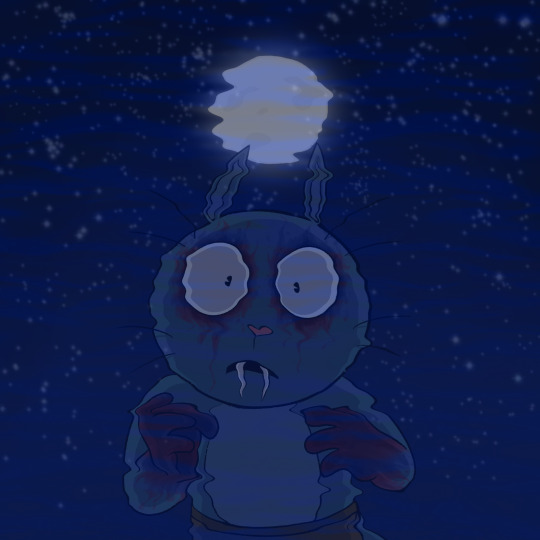
And so Geshtu walked. And walked. And walked. Staring up at the moon the entire time. He needed to understand. He needed to know why this happened and why it had saved him. He walked for a long time. And when the moon dipped below the atmosphere and the sun rose, he’d slink into whatever shelter he could find to rest. But when the moon arose again, he’d come out, and continue his pilgrimage, always staring directly at the moon, resulting in him moonblinking himself.
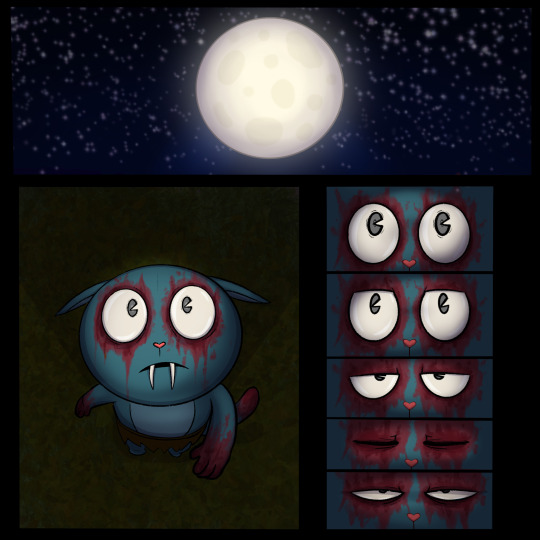
The more he walked, the more the pain faded. He grew more at peace the longer he walked and stared. Like the moon herself was taking away all the hurt for him. His circumstance began to feel less like a tragedy and more like fate. Eventually, he could hear her singing. First just a light humming, but eventually he began to hear words along with it. Crisp and clear and ringing throughout him. She spoke her name, Theia.
He walked for a very long time. Probably a few years. Just him and the moon. He traveled far, restaining his markings whenever he had the opportunity. He was born in blood and would be forever stained by it. On his journey, he’d occasionally run into passerby’s and other burrows, but these meetings were short and fleeting.
One night though, the moon led him into a small village. And when Geshtu entered, he knew he heard Theia say, “Here.”
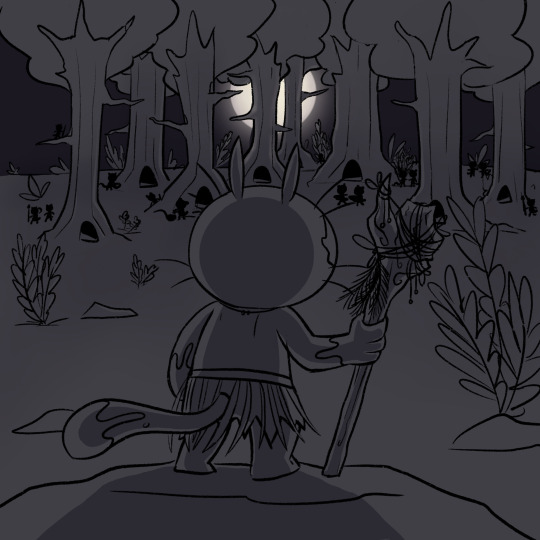
At first the villagers were unsure of him but helping other mammals traveling through was not unheard of for him. And Geshtu looked rough. He was a strange foreign vagabond with even stranger markings. But he showed them no hostility and they took him in and fed him. He was quiet but otherwise was grateful and polite.
Eventually he started murmuring prophesies to the people there. Little ones like “theia says the ridge to the west has the best seed gatherings” or “Theia warns not to go near the badlands on this night, there’s something malicious there…” and, by complete chance, almost all of these ended up true.
So now people were convinced that he really could hear the moon speaking to him and that the Theia was their friend. She was looking out for the little creatures of the night, who lived hiding in fear of the monsters of the daylight. And so Geshtu became trusted as the Villages Shaman, sent by Theia herself. He was the one people went to for divine advice
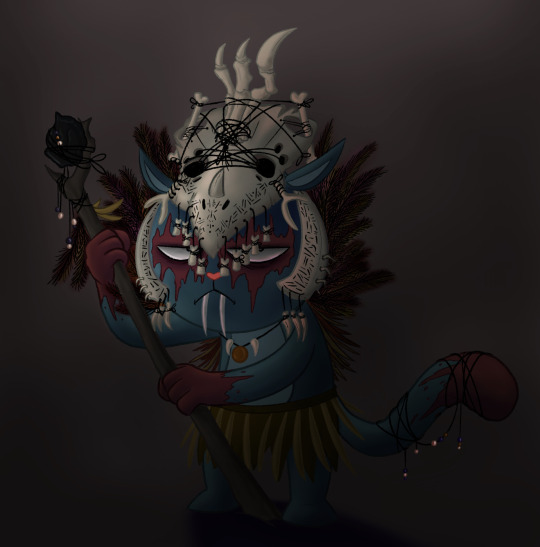
And that’s how he found his place there. He was convinced that his family HAD to die for this greater purpose. It was all supposed to happen. He was meant to come here and he was meant to save these people. The voices guide him to protect these creatures of the night, he is simply an agent of Theia. He believes wholeheartedly in everything Theia tells him. And…they say if you believe something hard enough the energy can manifest itself into reality. And so they eventually would. He, Dumuzi, and Nergal would eventually will themselves into godhood and bring forth a horror unlike any other.
#happy tree friends#htf#htf be brave#htf geshtu#loretime#WOW A BIG OL LORE POST????#THIS TOOK ME SO LOOOOONG BUT I DID IT#I love Geshtu btw did you know that?#I’ve been sitting on this story for a while#a little edgy I know but#that was long ago#but a little explanation for some of Geshtus little quirks#just little insights into who the trio are and how they ended up where they are now#don’t worry I have silly stuff in the works too!#I swear!#his shaman attire is based off a 9000 year old Neolithic shaman burial found in germany#the Bad Dürrenberg Shaman if anyone is interested#I’ll probably be editing in the future to fix my inevitable typos that I know I have but constantly miss as per usual#bear with me HAHA
106 notes
·
View notes
Note
1/2 Hi! I just wanted to know what u think about this, it's mostly my opinion but I just liked the subject so I found a little annoying how in some stories, the characters interact with each other TOO much, like, while they talk, they move, they do little described things that another character sees and analyzes like they are all from Lie To Me show and... it's not. I mean, yes, characters have conversation, but sometimes writers do this like both characters share a Mind.
2/2 I don’t talk to people normally at the same time that I put on my Sherlock’s hat or whatever. yes, you can deduce some things from the way the other moves but not as much as some writers do it. People have different minds souls, what someone does as an internal code it may not mean the same to the other character. It’s not enough excuse to do this between close friends, or lovers or parts of the character’s family, there is always things we don’t know and don’t understand about other people.
Hi! Whoa, that’s a complicated question. I guess my answer would be - that’s a necessary part of writing a story, and if you don’t like it, it probably means the writer isn’t doing a good job with it - because when it works as it should, you don’t notice it’s there.
One of the most complicated things about writing, if not the most complicated, is to pick a POV, stick with it, and make it work. To me, this is basically what defines good writing, and I find it very hard to keep reading when the POV shifts without reason.
Now, the problem with POV is that today, most stories tend to have a POV character, while in the past, it was more common to have an ‘artificial narrator’ looking down on the characters from the outside. The advantage of having a narrator is that he knows everything that’s going on, all the time; the disadvantage is that your readers can feel more distant from the characters, since they’re not directly inside their heads - and also, if clumsily done, it can break the suspension of disbelief, because if the readers see the narrator, they are reminded this is ‘just a story’, and therefore they shouldn’t care so much. The most transparent sign of an artificial narrator (aside from him ‘coming out’ to you and talking to you, as it happens in Jane the Virgin - “I bet you weren’t expecting that”) are, in my opinions, anticipations of things to come: “Sarah didn’t know it yet, but she would regret those words as long as she lived”. See what I mean? We’re not seeing the story through Sarah’s eyes - this is some other guy who knows about Sarah’s future.
Now, a POV character is normally written in third person (though 1st person stories are becoming more and more common) and the main problem with it is that as soon as you pick a POV character, you lose insight and knowledge into 98% of your own story. This is mostly why many writers today choose to write ‘choral’ stories, where every chapter is narrated by a different character - and I’m on the fence about that, because sure, as a reader I appreciate being able to know what other characters are thinking about, and how they react to the story, but I also consider it something of a lazy shortcut: if someone is a truly great writer, they could write from the POV of a 5-year-old and you’d still understand everything that’s going on (as is the case of Henry James’ What Maisie Knew).
Now, since stories generally have more than one character, it’s obvious that your reader must learn stuff about the other ones too - and here is where your impatience and annoyance come in. As you say, it’s not normal, or common, to study friends and strangers during conversations, or to think and talk at the same time. Most of us are blissfully oblivious to most things, worry more about ourselves, and how others perceive us, than about other people’s secret desires and ambitions, and we’re generally not very self-aware, let alone Sherlock-like skilled into understanding the world around us. And this is a problem for writers, because stories need to be close enough to real life to be convincing and believable, but artificial enough to be interesting. Some writers, including the guys who annoy you, err on the side of ‘interesting’, hence those acute and continuous insights into the lives of others that you find so artificial.
I’m with you, by the way - those things annoy the hell out of me as well. I actually find that, the older I get, the more impatient I am. As soon as I see something off, I’m like, Okay, they don’t know how to do the job - bye. I’m normally more tolerant with fanfiction writers, because I know that, like me, they’re learning, so I’ll ignore the slips in POV (just as I ignore the occasional typo or grammar craziness) if the story is interesting, but published authors - it makes me so angry, you know, because there’s supposed to be an editing team, and I inevitably end up thinking, There’s so many good writers out there and this idiot is the one who gets a book deal? And then other times I keep reading out of spite, and it’s useful, in a way, to make a mental check list of things you shouldn’t do, of scenes that do not work.
(Still, you know - why do we put up with bad books? We expect the guy who fixes our sink to actually do the job, but writers - somehow, we’re so in love with stories, and so desperate to get out of the boredom of our own lives, that we’ll read and watch anything, hence E. L. James and Honey Boo Boo.)
Finally, I think another reason why some writers do what you describe (and, again, most writers do that, but you only notice it when it’s done badly) is that we, as human beings, need reasons and clarity and an explanation for everything. It’s very obvious in children, and we learn to let it go a bit as we grow up, but it’s still there, it still bugs us. Why did she do that, why did he say that, why is this happening to me, why is the world not fair? We get upset and we get angry and sometimes we psychoanalyse the shit out of everything, because we can’t accept that the truth sometimes is, no reason. Real life is not a story: not everything has to make sense. And people - people may have ambitions and some kind of direction in life, but we’re mostly weird and unpredictable, as economists recently found out. This is probably why we’ve always liked stories so much - because they bring order in a disordered world. But, again, the problem you have as a writer is that yes, everything in your story must make sense but if it’s obvious that it makes sense, it won’t be convincing, because you’re pretending this is real life, and real life isn’t that neat. So it’s a tightrope, really, and some people are better than others at walking it. The danger, in my opinion, is that the more bad fiction we consume, the more used we get to believing everything we see at face value - since everything we see in those stories is explicit and out in the open, we assume that’s how other stories work, too. This is the problem we’re currently having in politics, of course, but you also see it in fiction, and, again, it’s not a harmless phenomenon. My advice is, trust your instincts. If a book annoys you, put it down. If a TV show is stupid, turn it off. The one good thing about the world we live in is that we’ve got a lot of choice - stupid and badly-written stories can be comforting because we’re lazy animals, but sinking your teeth into something a little worthier can be extremely rewarding.
63 notes
·
View notes